高考英语语法金点拨 虚拟语气
高中英语2025届高考语法复习虚拟语气知识讲解

高考英语语法复习虚拟语气知识讲解一、基础知识(一)什么是虚拟语气谓语动词的作用不仅可以表示动作的时间、状态、假设(情感),也是一种语气(mood)的表现形式,表明说话的目的和意图。
(语气包含陈述语气、祈使语气、虚拟语气、疑问语气)虚拟语气用于表示假设、愿望、建议、命令等非真实或虚拟的情况,即与真实相反。
上学的时候老师经常举的一个例子,"If I were you"因为我不可能是你,这是一种不可能存在的事实,所以这是个虚拟语句。
总而言之英语中的虚拟语气可以分为两大体系:一是表示与事实相反的,或者是假象的情形,通常由if引导,叫做虚拟条件句;另一个体系是在名词从句中使用虚拟语气,表示建议,命令或者要求等语气,类似于上述美剧常用的台词。
(二)虚拟语气的用法这一部分我们主要用虚拟语气在条件句中的用法作为讲解与现在事实相反:If I had a map, I would lend it to you.如果我有地图我就借给你。
(但我没有)与将来事实相反:If I were to do the job, I would do it in a different way. 要是我来做这工作,我会是另一种做法。
(言外之意不是我做这个工作,用虚拟表达是我做这份工作的可能性很低)与过去事实相反:If anything had happened, he would have let us know.如果发生了什么情况,他早就通知我们了。
(所以没事发生)它们的共性都是表示与事实相反或者实现可能性不大3.特殊情况①在极少情况下,从句的谓语动词用原形,主句的谓语动词可用陈述语气(比较官方,正式,大气的说法,口语很少使用)If that be the official view, it cannot be accepted.如果这是官方的看法,这是不能接受的。
②if可以省略,但是语序要改为倒装Were I Tom I would refuse.如果我是汤姆我会拒绝。
英语高考冲刺系列语法复习之考点七虚拟语气有讲解,有填空

英语高考冲刺核心语法复习考点七虚拟语气1.虚拟语气在条件句中的用法规则1:与现在事实相反,从句谓语用一般过去时(be动词用were),主句谓语用“would/should/could/might+动词原形”。
规则2:与过去事实相反,从句谓语用过去完成时had done,主句谓语用“would/should/could/might+have done”。
如:If I had done it in time,I should have had a good time.如果我及时做的话,我本该玩得很好。
(当时没能及时做)规则3:与将来事实相反,从句谓语用should do/were to do或一般过去时,主句谓语用“would/should/could/might +动词原形”。
如:If it were to rain tomorrow,I should not drive my car.如果明天下雨的话,我就不开车了。
(明天的情况还不知道)规则4:主句中的should通常用于第一人称,would可用于任何人称。
规则5:错综条件句:当条件从句的行为与主句表示的行为所发生的时间不一致时,主从句中动词的形式要根据其所表示的时间做出相应的调整,这就是所谓的错综条件下的虚拟语气。
如:If they had studied hard,they could do it easily now.如果他们以前努力学习的话,现在他们就能容易地解决这个问题了。
If he had not taken my advice,he wouldn't do it much better like this.如果他过去不听我的建议,他就不会像这样做得好多了。
规则6:虚拟语气的倒装:在条件句中,如果有were,had,should等,可省略if,把were,had,should等提到从句主语之前。
如:If he were to come,I would join him in the discussion.=Were he to come,I would join him in the discussion.如果他来,我将和他一道参加讨论。
高考英语复习语法知识专题讲解10---虚拟语气(解析版)

引导的让步和方式状语从 as if/though
He looks as if he were an artist.
句
He talked about the accident as if he had seen it.
in order that, so that, in case, for fear that
提前,即 故填 were/should/had
Were/Should/Had I..., Were
4. have fallen 解析:句意:要是没有政府和科学家的合作,与艾滋病相关的死亡人数就不会从 2005 年的 最高值降下来。从句“Had...not worked together”是对过去情况的假设,所以主句谓语要用 wouldn't have done.
necessary, natural, strange, important,
等 用 于 句 型 surprising, vital
“It
中, 引导的主语从 is+adj.+that...” that
句中谓语动词常用“(should)do”形式
It is necessary that he(should)sort out the information for my reference.
高考英语复习语法知识专题讲解 专题十 虚拟语气
一.虚拟语气在 if 非真实条件句中的应用
虚拟条件从句(if)
主句
与现在事实相反的 主语+did/were
假设
与过去事实相反的 主语+had done
假设
与将来事实相反的 主语+ 1.did/were
假设
2.should do
高中英语虚拟语气的用法归纳

高中英语虚拟语气的用法归纳以下是高中英语虚拟语气的用法归纳:虚拟语气是一种特殊的动词形式,表示假设、愿望、建议、命令、猜测等非真实的情况。
一、基本用法1. 与现在事实相反条件从句:If + 主语 + 动词过去式(be 动词用 were)主句:主语 + would/should/could/might + 动词原形例句:If I were you, I would study harder. (如果我是你,我会更努力学习。
)Wouldn't life be boring if we had everything we wanted? (如果我们想要什么就有什么,生活岂不是很无聊?)2. 与过去事实相反条件从句:If + 主语 + had + 过去分词主句:主语 + would/should/could/might + have + 过去分词例句:If I had known your phone number, I would have called you. (如果我知道你的电话号码,我就给你打电话了。
)Couldn't you have done better if you had tried harder? (如果你再努力些,难道不能做得更好吗?)3. 与将来事实相反条件从句:① If + 主语 + 动词过去式② If + 主语 + were to + 动词原形③ If + 主语 + should + 动词原形主句:主语 + would/should/could/might + 动词原形例句:If it rained tomorrow, we would stay at home. (如果明天下雨,我们就待在家里。
)If she were to come here tomorrow, I would be very happy. (如果她明天来这儿,我会非常高兴。
)If he should fail in the exam, how disappointed his parents would be!(要是他考试不及格,他父母该多失望啊!)二、固定搭配1. wish 后的宾语从句与现在事实相反:从句用一般过去时与过去事实相反:从句用过去完成时与将来事实相反:从句用 would/could + 动词原形例句:I wish I were as tall as you. (我希望我和你一样高。
【课件】高考英语语法总复习之虚拟语气课件

It is demanded that he (should) leave at once.
表示惊奇、不相信、惋惜等的从句中
巩固练习
1. If I _________ where he lived, I __________ a note to him.
A. knew, would
B. had known, would have sent
C. know, would send
D. knew, would have sent
SITUATION ONE:状语从句
条件状从 if
注意:虚拟语气中的倒装句
条件从句谓语中的were/had/should提到主语之前,此时应将if省去,形成部分倒装
Had you invited us, we would have come to your party.
练习1 使用动词的正确形式填空
SITUTATION THREE:特殊句式
It is (high) time that sb. did/ should do... It is time that everyone should work hard.
注意:that此时引导定语从句表示时间,相当于when
would/could/might/should/needn’t have done
6. I ________ him the answer ________ possible, but I was so busy then.
2024年新高考版英语主谓一致、虚拟语气、省略、倒装、强调讲解部分

“a number of+复数名词”作主 A number of other plants were
语时,谓语动词用复数形式,意为 found in America.在美洲还发现
“许多……”;“the number of+ 了许多其他的植物。
复数名词”作主语时,谓语动词 The number of people who travel
复合不定代词someone、anyone、everyone、nobody/no one、something、anything、everything、nothing等作主语时,谓语动词用单数
If anyone sees Lisa, ask her to call me.如果有人看 到莉萨,请她给我打个电话。 Nothing is impossible to a willing heart.世上无难 事,只怕有心人。
If he shouldn't come tomorrow, we would put off the meeting.如果他 明天不来,我们就推迟 这个会议。
使用“(should+)动词原形”的虚拟语气 1.用于宾语从句 以下动词后的宾语从句常常使用虚拟语气,即谓语为“(should+)动词原 形”。
原则
意义 一致
课标必备点梳理
常见用法
例句
当“几分之几/百分之几/half/ the rest/most+of+名词”结构作 主语时,一般根据of后的名词的 单复数决定谓语动词的单复数
20% of the people in the city object to the price of running water going up. 这个城市中百分之二十的人反 对自来水价格上调。
高中英语高考语法知识整理复习(虚拟语气+倒装句)

高考英语虚拟语气一、虚拟条件句中的虚拟语气1、表示与现在事实相反的情况从句:If+主语+did (be动词用were)主句:主语+ should/would/might/ could + doIf I were you, I would take an umbrella.如果我是你,我会带把伞。
(事实:我不可能是你)If I knew his telephone number, I would tell you.如果我知道他的电话号码,我就会告诉你。
(事实:不知道)If there were no air or water, there would be no living things on the earth.如果没有水和空气,地球上就不会有生物。
(事实:地球上既有空气也有水)2、表示与过去事实相反的情况从句:If+主语+ had + done主句:主语+should/would/might/could+have doneIf I had got there earlier, I should/would have met her.如果我早到那儿,我就会见到她(事实:去晚了)。
If he had taken my advice, he would not have made such a mistake.如果他听我的劝告的话,就不会犯这样的错误了。
(事实:没有听我的话)3、表示与将来事实相反的情况从句:①if+主语+were to do②if+主语+should+do③if+主语+过去式(be动词用were)主句:主语+should/would/might/could+doIf he should come here tomorrow, I would talk to him.如果他明天来这儿的话,我就跟他谈谈。
(事实:不可能来)If there were a heavy snow next Sunday, we would go skating.如果下周日下大雪,我们就去滑冰。
虚拟语气完整版本所有知识点
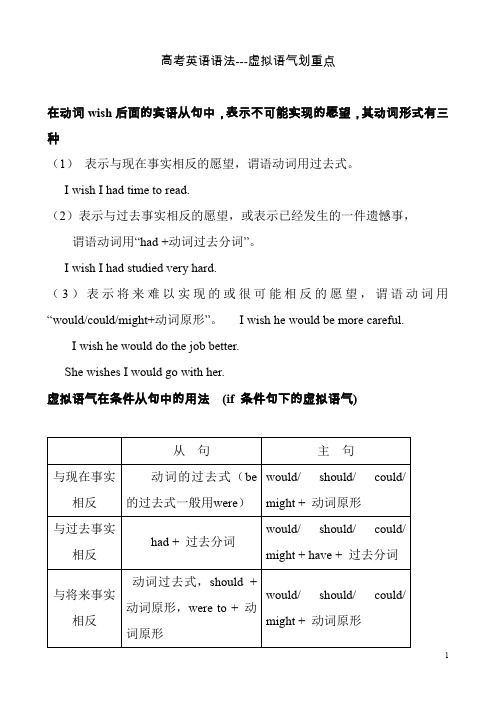
高考英语语法---虚拟语气划重点在动词wish后面的宾语从句中,表示不可能实现的愿望,其动词形式有三种(1)表示与现在事实相反的愿望,谓语动词用过去式。
I wish I had time to read.(2)表示与过去事实相反的愿望,或表示已经发生的一件遗憾事,谓语动词用“had +动词过去分词”。
I wish I had studied very hard.(3)表示将来难以实现的或很可能相反的愿望,谓语动词用“would/could/might+动词原形”。
I wish he would be more careful.I wish he would do the job better.She wishes I would go with her.虚拟语气在条件从句中的用法(if 条件句下的虚拟语气)终点1.Without (没有),but for(要不是), otherwise(否则), 这些词可以表示某种假设情况,从而省略条件句.I was busy last week ,otherwise I would have come to see you .= I was busy last week ,if I had not been busy last week, I would have come to see you1. Without electricity, human life____ quite different today. 对现在进行虚拟A. isB. Will beC. would have been2.But for the Party, he ____of hunger 30 years ago. 对过去进行虚拟B.would dieC. must dieD. must have died3. I was busy yesterday, otherwise I ____your bitrhday party. 对过去进行虚拟A. AttendedB. have attendedC. Would attend练习We lost our way in that small village, otherwise we _____ more places of interest yesterday.A. visited B. had visited C. would visit D. would have visited【答案】D重点2. 省略连词if 的虚拟条件句中(易错点☆☆☆)如果把连接条件从句的连词if省略,必须将从句的谓语部分的助动词had, 情态动词should或系动词were等移至主语之前,构成倒装语序。
高考虚拟语气用法归纳
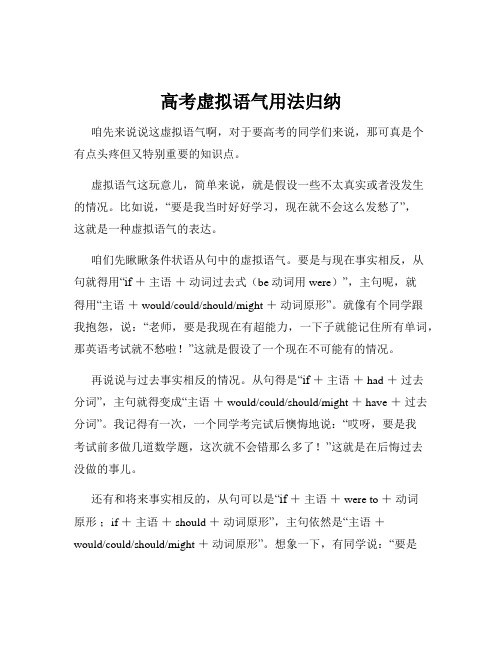
高考虚拟语气用法归纳咱先来说说这虚拟语气啊,对于要高考的同学们来说,那可真是个有点头疼但又特别重要的知识点。
虚拟语气这玩意儿,简单来说,就是假设一些不太真实或者没发生的情况。
比如说,“要是我当时好好学习,现在就不会这么发愁了”,这就是一种虚拟语气的表达。
咱们先瞅瞅条件状语从句中的虚拟语气。
要是与现在事实相反,从句就得用“if +主语+动词过去式(be 动词用 were)”,主句呢,就得用“主语+ would/could/should/might +动词原形”。
就像有个同学跟我抱怨,说:“老师,要是我现在有超能力,一下子就能记住所有单词,那英语考试就不愁啦!”这就是假设了一个现在不可能有的情况。
再说说与过去事实相反的情况。
从句得是“if +主语+ had +过去分词”,主句就得变成“主语+ would/could/should/might + have +过去分词”。
我记得有一次,一个同学考完试后懊悔地说:“哎呀,要是我考试前多做几道数学题,这次就不会错那么多了!”这就是在后悔过去没做的事儿。
还有和将来事实相反的,从句可以是“if +主语+ were to +动词原形;if +主语+ should +动词原形”,主句依然是“主语+would/could/should/might +动词原形”。
想象一下,有同学说:“要是明天世界末日,今天我就啥也不学,尽情玩!”虽然这事儿不太可能,但就是这种假设的虚拟语气。
虚拟语气在宾语从句里也有讲究。
比如说,wish 后的宾语从句,与现在事实相反用一般过去时;与过去事实相反用过去完成时;与将来事实相反用 would/could +动词原形。
我曾经听到一个同学许愿说:“真希望我现在是个学霸,啥题都会做!”这就是典型的与现在事实相反的虚拟语气表达。
还有在主语从句中,“It is +形容词(或过去分词)+that”结构中,如果形容词或过去分词表示“建议、要求、命令”等,从句的谓语动词要用“should +动词原形”,should 可以省略。
2025届高考英语虚拟语气知识点总结+课件
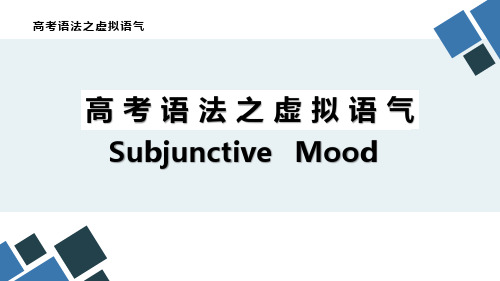
Homework
1. 完成高考汇编关于虚拟语气的练习题; 2. 用虚拟语气完成小诗。小诗的首句已给出。
If I were a bird, I would fly into the sky. ......
Thanks
为什么不用If I am a boy? 为什么不用If I was a boy?
虚拟语气是由句中的谓语动词的特殊形式表示出来的。
动词语气
1、虚拟语气:虚拟语气表示说话人的主观愿望、猜疑、建议或与事实不符 的假设等,而不表示客观存在的事实。 2、虚拟语气是由句中的谓语动词的特殊形式表示出来的。
你会辨认虚拟语气了吗?
对现在的虚拟条件从句
If there were no subjunctive(虚拟语气), English would be much easier.
从句
主句
If + 主语 + 过去式(were),主语 + should/would/could/might + 动词原形
来练一练
1. If there ____w__e_r_e____ (be) no air or water,there ____w_o_u__ld__b_e_____no living things on the earth.
如果我是个男孩 我想我能够明白 爱一个女孩是什么样的滋味 我发誓我会是一个好男人 我会倾听她, 因为我了解
When you loose the one you wanted 失去了你爱的人那有多痛苦
Cause he’s taken you for granted
因为他把你视作理所当然
And everything you had got destroyed! 你的一切都被毁
专题08 虚拟语气-【中职专用】中职高考英语二轮复习语法复习专项突破(全国适用)
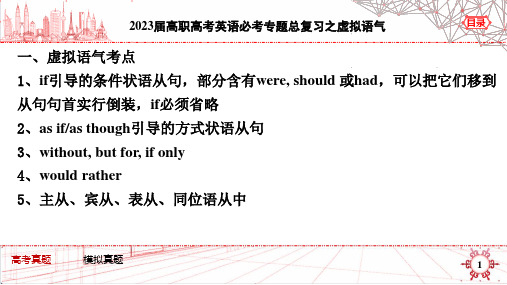
代表建议、提议、命令、要求等名词的同位语从句advice,
同位从 decision,demand,desire,idea,motion,order,
plan,proposal,request,suggestion
虚拟 (假)
VS
真实 (真)
由真变假的方式: 谓语动词的时态前移
I am a superman. I was a superman. I will be a superman.
plane.(2018年真题19)
A.caught
B.had caught
C.would catch
D.would have caught
本题考查虚拟语气。由句意“如果去机场的巴士没晚点,我们就赶上航
班了”可知本句是对过去事实的假设,主句用had done,则从句应用
would/could/should/might + have done。D项would have caught符合题
本题考查虚拟语气,故选C项。
高考真题
模拟真题
8
2023届高职高考英语必考专题总复习之虚拟语气
目录
模拟真题
( B )3.I would have told him the answer, had it been possible, but I ___ so busy then. A.had been B.was C.were D.would be 本题考查虚拟语气,故选B项。
高考真题
模拟真题
1
宾从
含义
(should) + 动词原形
现在完成时经常表示在以前某个时间已经发生的行为或曾经做过的事情对现在有某种影响;或从过去到一直延续到
高中英语虚拟语气知识点总结

高中英语虚拟语气知识点总结嘿,同学们!今天咱来好好唠唠高中英语虚拟语气这个知识点哈。
先来说说啥是虚拟语气,简单来讲,就是那些假设的、不太可能发生或者与现实不一样的情况要用的一种语气。
就好比啊,我有一天做梦,梦到我变成了超级英雄,可以在天上飞来飞去,这就是虚拟的嘛,现实中我可没这本事。
咱看哈,要是表示与现在事实相反,那谓语动词就得这么变:主句用“would/could/should/might + 动词原形”,从句用“一般过去时”。
比如说“要是我现在是个百万富翁,我就天天吃大餐”,那就是“If I were a millionaire now, I would eat big meals every day.”。
再说说与过去事实相反的情况,主句用“would/could/should/might + have + 过去分词”,从句用“过去完成时”。
我记得有一次考试,有道题我明明会做,可就是粗心做错了,哎呀,我当时就想啊,“要是我考试的时候细心点,我就不会丢这分了”,这就是“If I had been more careful in the exam, I might not have lost this score.”。
还有与将来事实可能相反的,主句用“would/could/should/might + 动词原形”,从句有三种情况,“were to do”“should do”或者“一般过去时”。
就像我想着要是将来有一天我能去外星球旅行,那可太棒啦,“If I were to travel to an alien planet in th e future, that would be really great.”哎呀,这虚拟语气啊,可得好好学,不然做题的时候就容易迷糊啦。
咱平时多练习练习,多造几个句子,慢慢就掌握啦。
相信大家都能把虚拟语气学好,加油哦!这样以后遇到相关题目就都能轻松搞定啦,就像我在梦里当超级英雄一样厉害呢!哈哈!。
高考英语重难点语法讲解-虚拟语气

⾼考英语重难点语法讲解-虚拟语⽓虚拟语⽓⼀、语⽓的定义和种类l、语⽓:语⽓是动词的⼀种形式,它表⽰说话⼈对某⼀⾏为或事情的看法和态度。
2、语⽓的种类:(1)陈述语⽓: 表⽰动作或状态是现实的、确定的或符合事实的,⽤于陈述句、疑问句和某些感叹句。
如:We are not ready. 我们没准备好。
What a fine day it is!多好的天⽓啊!(2)祈使语⽓: 表⽰说话⼈的建议、请求、邀请、命令等。
如: Open the door, please。
请打开门。
(3)虚拟语⽓: 表⽰动作或状态不是客观存在的事实,⽽是说话⼈的主观愿望、假设或推测等。
如: If I were you, I should study English. 如果我是你,我就学英语了。
May you succeed! 祝您成功!⼆、虚拟语⽓在条件从句中的⽤法条件句有两类,⼀类是真实条件句,⼀类是虚拟条件句。
如果假设的情况是有可能发⽣的,就是真实条件何。
在这种真实条件句中的谓语⽤陈述语⽓。
如: If it doesn’t rain tomorrow, we will go to the park. 如果明天不下⾬,我们就去公园。
如果假设的情况是过去或现在都不存在的,或将来不⼤可能发⽣的,则是虚拟条件句。
如: If he had seen you yesterday, he would have asked you about it. 如果他昨天见到你,他会问你这件事的。
(事实上他昨天没见到你,因此也未能问你这件事。
)①错综时间条件句:当条件状语从句表⽰的⾏为和主句表⽰的⾏为所发⽣的时间不⼀致时,被称为错综时间条件句,动词的形式要根据它表⽰的时间作出相应的调整。
如:If you had followed my advice just now, you would be better now.If you had studied hard before, you would be a college student now.②if省略句在条件句中可以省略if, 把were, had, should提到句⾸,变成倒装句式。
虚拟语气---高考英语简单归纳整理(一)

虚拟语气---高考英语简单归纳整理(一)定义虚拟即假设,用来表示说话人的主观愿望或假想。
生活当中我们谁没有说过“我希望”,“但愿我是……”“我宁愿。
”“假如……我会……”如此这般的一厢情愿的话呢?而这些想法可以是:明知事情不可能发生而做出的假设;对过去的事表示的愿望,遗憾或悔恨;对将来的期盼和祝愿。
一、同位语从句及表语从句中的虚拟1、adviec,suggestion,request,requirment,order,demand,plan,idea,desire等,从句使用should+v 例如:His advice is that we should worked hard二、主语从句的虚拟语气it is important/srange/necessary/natural/........that+that从句例如:it is stange that he shouldn't comeit is important that we should learn our lessons well first.三、it is/was suggested/requested/proposed/desired +that sb+should +v例如:it is suggested that we should finish the work next week.it is requested that we should have a picnic.四、it worries sb that.....(that 从句中使用should+v)译为令人担心的是........例如:it worries me that we should have a test again.五、it is a pity /a shame/no wonder+that +should +vit is a pity that he should do that六、在句中直接使用V(动词)例如:long live chairman maoGod bless you七、在以in case,for fear(that)和lest引起的从句中,谓语动词用should+v例如:she took the raincoat with her in case she should be caught in the rain/Remember to remind me of that in case I should forget.以上对虚拟语气的总结,那是我高中做英语的一点笔记,这只是简单的一面,希望能帮到一部分英语语法这一块不太懂的人,这也只是针对那些高考者们,希望能对他们带来一定的帮助!。
高中英语2025届高考语法复习情态动词与虚拟语气知识讲解
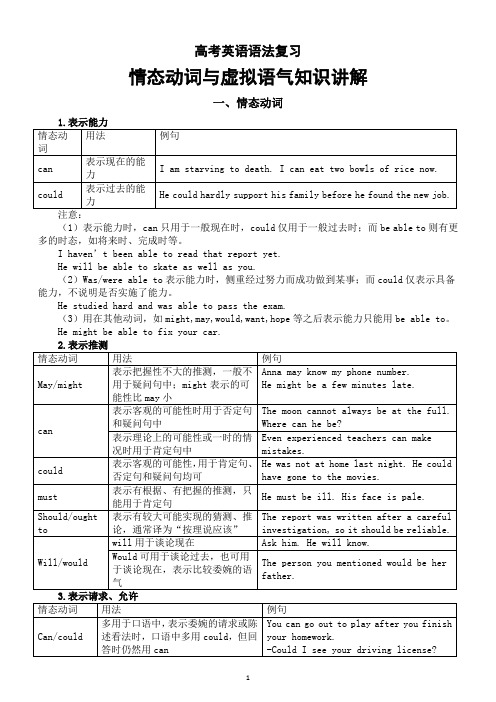
高考英语语法复习情态动词与虚拟语气知识讲解一、情态动词(1)表示能力时,can只用于一般现在时,could仅用于一般过去时;而be able to则有更多的时态,如将来时、完成时等。
I haven’t been able to read that report yet.He will be able to skate as well as you.(2)Was/were able to表示能力时,侧重经过努力而成功做到某事;而could仅表示具备能力,不说明是否实施了能力。
He studied hard and was able to pass the exam.(3)用在其他动词,如might,may,would,want,hope等之后表示能力只能用be able to。
He might be able to fix your car.(1)must还可以表示质问或感情色彩,意为“偏要,偏偏”。
Why must it snow on Saturday?(2)should还可以表示惊奇、愤怒、失望等特殊情感,尤其用在以why,who,how等开头的疑问句中或某些感叹句中。
why should you be so late today?(1)must作“必须”讲的一般疑问句,其肯定回答用must,否定回答用needn’t或don’t have to。
-Must I pay now?-Yes, you must./No, you needn’t.(2)need还可以作实义动词,有人称和数的变化,后跟带to的不定式作宾语。
She needed to go out for a walk.(1)两者在表示过去的习惯动作或行为时常可通用。
When we were children, we would/used to go skating every winter.(2)Used to与would都不能与表示具体频率、次数的词及特定的时间状语或具体的一段时间连用。
高考英语语法——虚拟语气

虚拟语气一、定义:虚拟语气表示动作或状态与事实相反,或不可能发生的情况。
1.虚拟语气用于条件状语从句中1)表示与现在事实相反或不可能发生:一般过去时(虚拟语气中be→were)Eg. If he had time, he would (could, might) go with youEg.If I were you, I would work hard.2)表示与过去事实相反或不可能发生Eg.If I had time last night, I should have come to see you.Eg.If they had helped us, we would have finished the task. (实际上没帮)3)表示与将来的事实可能相反或不可能发生Eg.If it should rain, the crops would be saved.Eg.If it were to snow tomorrow, they would not go out.4)※注意:虚拟语气的倒装语序:如果if从句里含有should, had, were或其他助动词,则可将从属连词if省去,将助动词.情态动词.be或have放在句首形成部分倒装.Eg.If I had time, I would have done that yesterday.=Had I had time, I would have done that yesterday.Eg.If I were you, I would go to the party.=Were I you, I would go to the party.Eg.If it should rain tomorrow, I would stay at home=Should it rain tomorrow, I would stay at home.2. 虚拟语气在宾语从句中的用法在动词wish后的宾语从句中,表示与现在或过去的事实相反,或对将来的主观愿望,从句通常省略连词that。
- 1、下载文档前请自行甄别文档内容的完整性,平台不提供额外的编辑、内容补充、找答案等附加服务。
- 2、"仅部分预览"的文档,不可在线预览部分如存在完整性等问题,可反馈申请退款(可完整预览的文档不适用该条件!)。
- 3、如文档侵犯您的权益,请联系客服反馈,我们会尽快为您处理(人工客服工作时间:9:00-18:30)。
高考英语语法金点拨虚拟语气虚拟语气是一种特殊的动词形式,用来表示说话人所说的话不是一个事实,而是一种假设、猜测、怀疑、愿望、要求、命令、建议等。
1.If you had come a few minutes earlier, you would have met him.要是你早来几分钟的话,你就能见到他了。
(与过去事实相反)2. If it were sunny tomorrow, I would come to see you.明天要是天气好的话,我来看你。
(与将来事实可能相反)3. If I were you, I would go at once.假如我是你的话,我会马上走。
(与现在事实相反,事实上我不可能是你)(一)、省略 if 的条件从句当从句中有 were, had 或 should 时,可省略if ,而把它们放在句首。
If I were to meet him tomorrow, I should ask him about it.-----Were I to meet him tomorrow, I should ask him about it.If he should fail in the experiment this time, he would try again.----- Should he fail in the experiment this time, he would try again. (二)、错综时间的条件句即从句与主句的动作发生的时间不同。
此时,需要按时间来确定虚拟形式。
如:If they had studied hard, they could do it easily now.如果他们以前努力学习的话,现在干的就会容易些。
If he had not taken my advice, he wouldn't do it much better like this.如果他不听取我的建议,他就不会干得这样好。
If I were you, I would have taken his advice. (从句指现在, 主句指过去) (三)、含蓄条件句有时假设的情况并不以条件从句表示出来,而是暗含在上下文中.But for your advice, I could not have done it so successfully.The change could not have taken place without the open-door policy.I was so busy then, Otherwise, I would have told him the answer.二、在宾语从句中1、下列动词后面接的宾语从句:表示建议(suggest, advise, propose, recommend),要求(demand, request, require, insist), 命令(order, command)等动词用should + do 构成,should 可省略。
He ordered that the students wash the clothes every week by themselves.他要求学生每周都要自己洗衣服。
2、 wish接宾语从句有三种情况:1) 现在:用过去式2) 过去:用过去完成式 (had done)3) 将来:用情态动词(would / could/might) + doI wish she would be on my side. 我希望她能站在我一边。
I wish I were 30 years younger. 我但愿自己能年轻三十岁。
I wish (that) you would get a good job. 我希望你能找到一个好职业。
He wished he hadn't done it. 他想要是他没这样做该多好。
3、记住:insist / suggest 各有两种意思,要用不同的语气Insist 表“坚决要求”用虚拟形式,即 should + do;表示“坚持说”,用陈述语气,表示事实。
Suggest 表示“建议”时,用虚拟形式。
表示“表明、暗示”时,用陈述语气。
His pale face suggested that he was ill and the teacher suggested that he (should) see the doctor.He insisted that all of us should be there on time by any means.他坚持要我们大家想尽办法按时去那儿。
He insisted that he was right.4、在would (had) rather(宁愿) 引导的宾语从句中当从句表现在或将来时,谓语动词要用一般过去时;表示过去时间时,谓语动词要用过去完成时。
I would rather he came tomorrow than today. I’d rather they hadn’t gone to school yesterday.三、在主语从句中1.句型:It is insisted/ ordered/ commanded/ suggested/proposed/advised/desired/demanded/required/requested,etc+Subject –clause (should)do It is suggested that middle school students (should) preview their lessons before classes . 建议中学生课前应预习课文。
2.在句型“It is important (necessary, strange, natural) that .... ”中,that后面的从句中的谓语动词用:should + 动词原形It’s necessary that we should have a walk now. 我们有必要出去散散步。
It’s natural that she should do so. 她这样做是很自然的。
It’s important that we should take good care of the patient. 重要的是我们要照顾好病人。
3. 用于“It is a pity, it is a shame等+ that” 等结构后的主语从句中,从句中的谓语动词用:should + 动词原形 It is a pity that he should be so careless.四、在表语从句中主句的主语常是表示说话人愿望(wish / desire)、建议(suggestion / advice) 要求(requirement / demand)、命令(order, command)等的名词,表语从句的谓语动词用(should) + do.Our suggestion is that you (should) be there on time.五、在同位语从句中同位语从句的先行词常是表示说话人愿望、建议、要求、命令等的名词。
The suggestion that students (should) learn something practical is worthconsidering.Do you know the order that you (should) keep watch.六、在 as if/as though 从句中()在as if 从句中,常用虚拟形式,谓语动词同wish.(一)、as if 连接表语从句she looked as if she were made of ice. 她看起来似乎是冰做的he looked as if he hadn’t slept for two days.(二)、as if 连接方式状语从句She looked after the boy as if he were her own son.她照顾这男孩就像自己的儿子一样。
He speaks to us as if he had been there. 他给我们讲的好象他去过那儿。
注:在look, seem等动词后的“as if / as though”从句中,当表真实情况时,用陈述语气; 否则用虚拟语气.It seems as if they know each other. (真实情况) It seems as though it were already spring. (虚拟语气)七、虚拟语气中的几个特例1. if only 意为:若是...那该多好啊; 真希望...; 只要, 只要...就好表示现在的情况,应用过去式; 如果是过去的情况,应用过去完成时态If only I had arrived in time! If only she didn’t drive so fast.2. It’s (high/right) time that…that 从句要用虚拟语气:谓语用过去时或should + do (should 不可省)It’s time that you left here.3.Would you mind if I did ? / Do you mind if I do ?我打开窗户你介意吗?Would you mind if I opened the window? Do you mind if I open the window?Do /Would you mind my opening the window?4.for fear that (生怕) / in case (以防) +目的状语从句( should) doTake an umbrella with you in case it should rain.5.情态动词 + have done(以下表对过去某事的责备或懊悔)could have done 本来可能- - - might have done 本来可以- - -should/ought to have done 本来应该做- - shouldn’t/ought not to have done 本不该做 - -had better have done 当时最好做了- - - had better not have done当时最好没做- - -would rather have done 当时宁愿做了- - - would rather not have done 当时宁愿没做 - -needn’thave done 本不必做 - - - didn’t need to do 没必要做也没有做 - - -I dressed very warmly for the trip,but I needn't have done so.The weather washot.You needn't tell John about it. I've told him already.I would rather have taken his advice at the meeting .我宁愿在会上听从了他的意见You had better not have scolded her.你最好没有责备过她。
